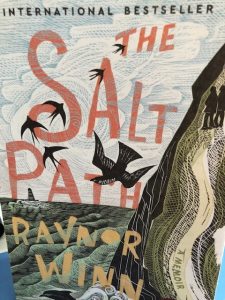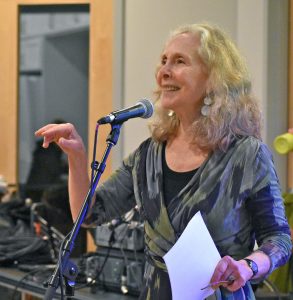|
I just discovered a memoir called The Salt Path, written by a British author named Raynor Winn. This book hit the spot for me. Why? Okay this may sound a little cliché, but it’s about a couple that overcomes adversity against enormous odds. (yawn, I’ve heard that before). I don’t know about you, but I can use a little inspiration these days. Raynor (or Ray) and her husband, Moth, have owned and run a family farm in the UK for thirty years. They’ve led a full life, living by the seasonal demands of the land. They’ve raised animals; they’ve raised kids, and over the years, their farm has flourished. Then Moth is diagnosed with a neurological illness called “corticobasal degeneration”,or CBD, in which parts of the brain deteriorate. The prognosis is dire: physical and mental decline, leading to death within a 6-8 year period. If that wasn’t enough, soon after Moth’s diagnosis, the couple loses their home (due to a bad investment), becoming poverty-stricken and homeless. That would pretty much flatten me out. But not them. They decide to take a 630-mile hike over the jagged terrain of the South West Coast Path. And why not? They have nothing to lose, literally… Ray and Moth begin their journey with very little money, which propels them to do “wild camping” (no camping fees). This means they’ll sleep wherever they can find a comfortable (or uncomfortable) patch of ground – whether it’s on a cliff, in the woods or on the beach. Ray is 50 when they start out, and she describes herself as out-of-shape. I’m not sure how old Moth is, but age is irrelevant when you’re dying of a degenerative disease. Clearly, this is not a “walk in the woods” (pun intended) for either of them, but particularly for Moth, who can barely move his body at the beginning of their journey! Still, they’re motivated for this adventure. They carry light packs with basics, hike for miles every day, eat a lot of fudge and pasties and noodles, because that’s what they can afford, and eventually, they begin to see beauty and joy around them. They encounter a group of surfers who are entranced by their journey, and they meet groups of tourists who see them as smelly homeless people who are to be disdained. But they don’t care! But more than that, the book offers some lessons about caregiving. Ray and Moth are on a journey together, but it’s Moth who is very ill and needs support. Even though they agreed to do this hike together, there are times when Ray questions whether it was a wise decision. Nonetheless, they soldier on. Ray nurses Moth when he’s sick with fever, gets him tea, and walks the extra mile (literally) to get some provisions, when Moth doesn’t have it in him. While the context of caregiving – going on a major hike against all odds – is not one that most (any?) of us would choose, there are some important lessons to be learned from their journey. As caregivers, how can we help the person we’re caring for experience life, to the extent they’re able? How can we ensure that the person we’re caring for feels respected as a whole person by us and others they encounter, despite their frailties and/or illness? How can we live with the uncertainty of how and at what rate the person we’re caring for will decline? And how can we hold onto (some) joy, both for ourselves as well as with our loved ones, regardless of the challenges of caregiving work? What are your thoughts about these questions? Please email me at contact@theshapeofcare.org. I’d love to hear from you, and I promise to respond!
|
 Ever find a book that feels perfect for what’s going on in your life or in the world?
Ever find a book that feels perfect for what’s going on in your life or in the world?